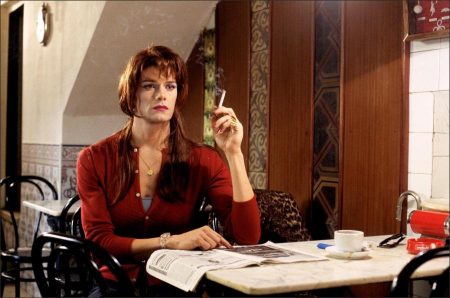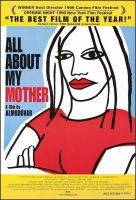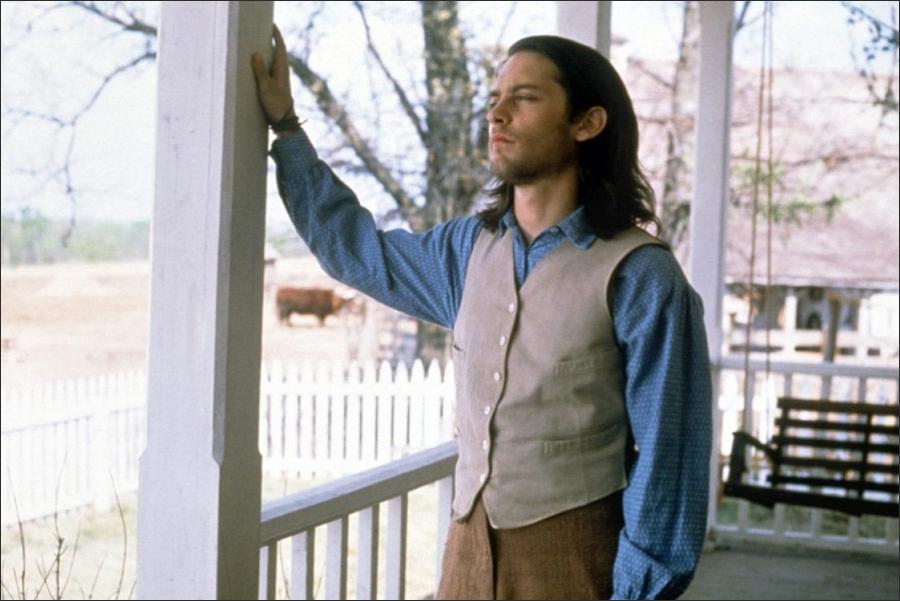Taglines: Part of every woman is a mother / actress / saint / sinner. And part of every man is a woman.
All About My Mother movie storyline. Manuela is a hard-working single mom who has raised her son Esteban by herself since the time he was born. On his 17th birthday they go to the theater and after the show, Esteban tries to get the main actress’ autograph but is run down on the street and dies.
Manuela is beside herself with grief and decides to return to Barcelona to tell the boy’s transgender father Lola, about the death of the son he never knew he had. He is nowhere to be found but Manuela does find an old friend, Agrado and meets up with a pregnant nun, Rosa. Together they form a life and become fast friends – until tragedy strikes again.
All About My Mother (Spanish: Todo Sobre mi Madre) is a 1999 Spanish drama film written and directed by Pedro Almodóvar, and starring Cecilia Roth, Marisa Paredes, Penélope Cruz, Candela Peña, Antonia San Juan, Rosa Maria Sardà, Fernando Guillén, Toni Cantó, Eloy Azorin and Carlos Lozano.
The plot originates in Almodóvar’s earlier film The Flower of My Secret (1995) which shows student doctors being trained in how to persuade grieving relatives to allow organs to be used for transplant, focusing on the mother of a teenager killed in a road accident. The film[clarification needed] deals with complex issues such as AIDS, homosexuality, transsexualism, faith, and existentialism.
The film was a commercial and critical success internationally, winning the Academy Award for Best Foreign Language in addition to the Golden Globe for Best Foreign Language Film and the BAFTA Awards for Best Film Not in the English Language and Best Direction (Almodóvar). The film also won 6 Goya Awards including Best Film, Best Director (Almodóvar), Best Actress (Roth).
Film Review for All About My Mother
Bette Davis ‘ mouth is a lipstick slash. She sticks a cigarette into it and Spanish comes out. It is a dubbed version of “All About Eve” and provides the title for “All About My Mother,” which is unmistakably Pedro Almodovar’s new film.
No one else makes movies like this Spanish director. Transvestite prostitutes, wayward nuns, runaway mothers and other women on their own are all filtered through — and enlarged by — Almodovar’s female-identified sensibility. Gender is optional. In other hands, these characters might be candidates for confessions — and brawls — on “The Jerry Springer Show,” but here they are handled with utmost sympathy.
None of these goings-on is presented as sordid or seedy. The presentation is as bright, glossy and seductive as a fashion magazine. It is also as technically accomplished — propulsive music picks up where swooping camera work leaves off. The tone of “All About My Mother” has the heart-on-the-sleeve emotions of soap opera, but it is completely sincere and by no means camp.
Almodovar is starstruck by female movie icons like Davis, and his movie provides a field day for a company of actresses. Argentine-born Cecilia Roth is Manuela, the single mother of 17-year-old Esteban, who aspires to be a writer. She has never told him anything about his father; now he wants to know about the “missing half” of his life, the father who was pictured on the half of photographs that she tore off and threw away.
Esteban’s father is now called Lola, for reasons that are not immediately clear but will be. Manuela’s journey from Madrid to Barcelona to track him down brings her across an old friend who is now a transvestite prostitute, an actress who sleeps with her junkie female assistant, a nun who is going into hiding and the nun’s mother, a painter who forges Chagalls.
Almodovar being Almodovar, none of this is seen as out of the ordinary. This is quite a group, but the standout is Antonia San Juan as the tough, good-natured transvestite prostitute who tells how she came to be called Agrado: “I’ve always tried to make life agreeable for others.”
She is a former truck driver with a crooked nose and eyes that sometimes cross. She also barks like a dog. A close- up of her is the quintessential image of this movie: a trannie with a battered face. It is oddly beautiful. Agrado takes Manuela to visit a young nun, but first dresses her like a prostitute because “the nuns only help whores and transvestites.” Agrado herself wears a Chanel knockoff.
The extraordinarily beautiful nun, played by Penelope Cruz, will turn out to be unexpectedly earthy. It also turns out that she knew Lola, too — she helped him through detox. Throughout “All About My Mother,” life imitates art. There is “All About Eve,” to begin with. Then, Manuela, who works in a hospital, appears in a video public service announcement for organ transplants. It will become a rehearsal for her own life. She also has played the abused and pregnant Stella in a production of Tennessee Williams’ “Streetcar Named Desire,” and will again.
Life experience shows on the faces of the women in this film. Roth has a slightly haggard beauty. The formidable Marisa Paredes plays Huma Rojo, the star of a touring production of “Streetcar,” whose hair seems to be a different color almost every time she appears. She drinks out of a flask, takes tranquilizers and smokes. “Smoke’s all there’s been in my life,” Huma says.
These women, grouping and re- grouping in various combinations, keep surprising each other. They always come through for each other as well. When the play can’t go on, Agrado is more than a good trouper. She stands up and delivers a wonderful monologue to the audience on how she became an “authentic” woman, giving the price tag of each acquired body part. “It costs a lot to be authentic.” “All About My Mother” is the real thing.
All About My Mother (1999)
Directed by: Pedro Almodóvar
Starring: Cecilia Roth, Marisa Paredes, Penélope Cruz, Candela Peña, Antonia San Juan, Rosa Maria Sardà, Fernando Guillén, Toni Cantó, Eloy Azorin, Carlos Lozano
Screenplay by: Pedro Almodóvar
Production Design by: Antxón Gómez
Cinematography by: Affonso Beato
Film Editing by: José Salcedo
Costume Design by: José María de Cossío, Bina Daigeler
Set Decoration by: Federico García Cambero
Art Direction by: Antxón Gómez
Music by: Alberto Iglesias
MPAA Rating: R for sexuality including strong sexual dialogue, language and some drug content.
Distributed by: Sony Pictures Classics
Release Date: April 16, 1999 (Spain), May 19, 1999 (France)
Views: 279







